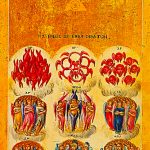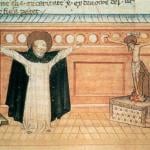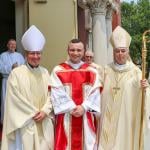A reader writes:
Mark: I saw you on TV on EWTN’s Bookmark with Doug Keck discussing your books: Mary, Mother of the Son. You and Doug made reference, an off handed remark regarding someone named “Lorraine Brettler” (spelling?) referring to someone who expounds on Mary as pagan goddess. I am not familiar with this woman and there was no explanation in the show and I googled it as well and cannot come up with anything. Thanks.
The name is “Loraine Boettner” and he’s actually a guy. He’s the author of the great One Stop Shopping Book for All Your Anti-Catholic Needs called Roman Catholicism.
A great deal of anti-Catholic literature out there is a regurgitation of junk from Boettner, such as the ever-circulating List of Catholic Inventions that land in my mailbox now and then in various forms of mutation. I discuss this in the first volume of Mary, Mother of the Son (Modern Myths and Ancient Truth):
Pseudo-Knowledge in Popular Evangelical Critiques of Catholic Teaching
For I had already discovered that Boettner is a great fount of worthless claims and pseudo-knowledge about the supposed pagan origins of the Catholic faith. For instance, he offers a list of alleged “Roman Catholic inventions” that overwhelms us with charges which compensate for their lack of importance and basic honesty by the sheer force of numbers. Over and over we run into outright errors of fact such as:
• Latin used in worship—AD 600 (Response: So why did Jerome translate the Bible into Latin two hundred years before AD 600? And what does this claim signify, anyway? If most people spoke Latin at that time, why shouldn’t Latin have been used in worship? Does Boettner find it sinister that English is used in worship today?)
• Prayers for the dead—AD 300 (Response: This will certainly come as news to Judas Maccabeus who prayed for the dead over four centuries earlier. See 2 Macc. 12:42–45.)
• Council of Valencia places the Bible on the Index of Forbidden Books—AD 1229 (Response: There was no Council of Valencia in 1229 because Valencia was in Moorish hands at the time.)
Or items of numbing inconsequence like:
• Wax candles—AD 320 (Response: Why does this matter? How does Boettner know wax candles were first used in AD 320? Given that the use of electricity was still far in the future and that worship frequently occurred before sunrise so Christian slaves could attend, how else does Boettner expect the Christians to have read Scripture in the dark?)
• College of Cardinals begun—AD 927 (Response: Actually, the term “College of Cardinals” dates from the mid-twelfth century. Cardinals elect the pope. The office was created to protect papal elections from outright meddling by rival Italian clans. It was a creation of human ingenuity in response to a particular need, much like an Evangelical church’s finance council, or a Board of Elders being charged with finding the new pastor at the Baptist church down the street. So why is this particular bit of administrative innovation significant?)
• Baptism of bells instituted by Pope John XIII—AD 965 (Response: “Baptism of bells” refers to a common custom of christening church bells. It’s about as dastardly as breaking a bottle of champagne against the bow of a ship.)
Now the interesting thing is that The List has been a staple on the Internet for so many years that the vast majority of the people who regurgitate it don’t even know where it originates. Yet it continues to circulate, like a bad penny—or like Kersey Graves’s The World’s Sixteen Crucified Saviors circulates among Dan Brown disciples. A quick Google search reveals hundreds of sites reprinting The List and I’ve been sent countless e-mail regurgitations of it. The e-mails are usually accompanied by unconsciously ironic admonitions to “think for yourself and stop letting others tell you what to believe” from people who are completely unaware they’re parroting something they’ve never thought about or checked out for themselves. Such people typically seem to assume “If there are so many claims against the Catholic Church, it stands to reason there must be something to the idea that Catholic doctrines are basically pagan.” But the reality is that 0x0x0x0=0, not “If you throw enough mud, some will stick.” The reality also includes, “You shall not bear false witness against your neighbor,” as Christians ought to know.
Catholics are not without a sense of humor about all this, of course. A friend of mine once concocted a playful “Protestant Inventions List” in response to his receiving the umpteenth e-mail of The List. It runs, in part:
AD 90 Sunday worship taught by Didache
AD 180 God first declared as a “Trinity” of three persons by Theophilus
AD 381 Prayer to the Holy Spirit authorized by Council of Constantinople
AD 397 Book of Revelation (till now dubious) proclaimed to be “Scripture”
AD 400 Augustine invents “original sin”
AD 418 Salvation apart from Jesus declared heretical by Pope Zosimus
AD 431 Ephesus declares Mary’s human son to be God himself
AD 525 Calendar for Easter Sunday instituted
AD 950 Invention of Bible in English
AD 1215 Declaration that God created the world “out of nothing”
AD 1455 Scheme for printing the Bible invented by Gutenberg
AD 1760 Singing of “Amazing Grace” instituted by John Newton
AD 1776 Protestant Founders of America downgrade Blessed Trinity to “Nature’s God”
AD 1825 Altar calls instituted by Charles Finney
AD 1863 U.S. government enforces Thanksgiving to God as official state holiday
AD 1864 Mammon worship first authorized by United States government. “In God We Trust” stamped on U.S. money
AD 1900 Light bulbs used in worship services
AD 1929 Wednesday night Bible study invented
AD 1951 Preachers begin to dress in polyester suits
AD 1959 Televangelism instituted by Pat Robertson
AD 1965 “Four Spiritual Laws” promulgated by Bill Bright
AD 1969 Unbiblical phrase “Accept Jesus Christ into your heart as your personal Lord and Savior” popularized
AD 1970 Overhead projectors used in worship service
AD 1978 Abortion declared to be a grave sin by Evangelicals and Fundamentalists
AD 1991 “Promise Keepers” founded on pattern of neo-pagan “men’s groups”
AD 1998 Sale and commercialization of WWJD bracelets
AD 2001 “Faith-based” government founded by George W. BushHis list is, of course, a deliberately silly concoction of inconsequential items, legitimate developments of doctrine, sinister-sounding (but harmless) adaptations of the Christian life to different cultural circumstances, and laughable twisting of fact. However, it’s also an instructive rejoinder that points out an important truth: We do need to think for ourselves—particularly about what “everybody knows” concerning the “pagan origins” of Catholic teaching. For this peculiar pattern of endlessly circulating and re-circulating absurd and sinister-sounding “facts” about the Catholic faith is very common in Evangelicalism when it comes to Catholic beliefs about Marian devotion and doctrine.















